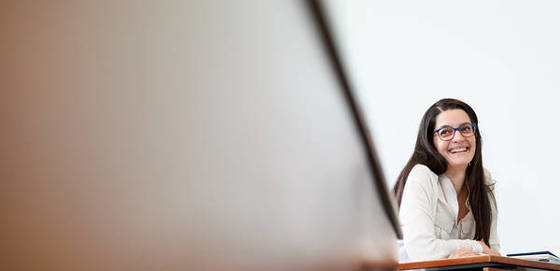HEC Paris Professor Giada Di Stefano received three prizes from the prestigious Strategic Management Society
Giada Di Stefano, Professor of Strategy scooped up 3 prizes at the annual conference in Berlin organized by the Strategic Management Society (SMS) in September 2016. Her article “Narrative construction during strategic change: A dynamic perspective” was received the Best Paper Award in the domain of Strategy Process, as well as one of the five finalists for the Best Paper Award across all domains. On top of that, her paper “Under a magnifying glass: Understanding the micro-foundations of organizational learning” received the Best Paper Award in the domain of Behavioral Strategy. Giada Di Stefano tells us why winning these awards was so special and passionately explains what her research is about…

“This is a great honor, and makes me very proud. I am particularly happy because both of these papers showcase my more recent research interests. Despite being very different in terms of approach and method, both papers articulate the importance of reflection for firm performance - a topic that is close to my heart.The paper "Under a magnifying glass: Understanding the microfoundations of organizational learning" explores how individuals can perform better if they take the time to stop and think about their experience with a task. Together with my co-authors – Francesca Gino and Gary Pisano (Harvard Business School), and Bradley Staats (University of North Carolina) – we look at individual learning, and the extent to which people who set some time apart for reflecting on the experience accumulated with a task outperform those who spend the same amount of time practicing. To this end, we ran a number of laboratory experiment and a field study with Wipro, a service provider company. The results are striking: in the field study we find a 21% performance increase by substituting the last 15 minutes of work with 15 minutes of reflection on the activities carried out during the day.
The other awarded paper "Narrative construction during strategic change: A dynamic perspective" examines the case of an organization that has decided to document its reflection efforts over a major strategic change it was undergoing. It is the case of Alessi, the Italian producer of household goods. At the end of the 1970s, Alessi started repositioning from manufacturing kitchenware mainly for restaurants and bars, to manufacturing household objects that were appreciated by the higher end of the market as cultural goods, recognized for their symbolic value, and even exhibited in modern art museum collections. Over the following 30 years, the company published about 30 books, aimed at describing (and reflecting on) the change it was going through. Together with my co-author Elena Dalpiaz (Imperial College London), we analyze this narrative corpus using a combination of qualitative and quantitative techniques, so to be able to uncover how Alessi's top management used these reflection efforts to accompany change, increase its acceptance within the firm, and legitimize the new firm identity.
What I love about this paper is the rich case we work on, the interesting combination of methods, and the tremendous effort we exert at synthesizing all these narratives and abstracting from them. Working on this paper is also great fun. Elena and I are very close friends since the times we were colleagues during our Ph.D. at Bocconi. As researchers, however, we really see the world through different lenses, which makes the interactions between us extremely complex, but also incredibly rewarding.
Overall, I really see these two articles as very complementary. Each of them probably appeals to a slightly different audience - one is experimental, the other mainly qualitative; one is at the individual, the other at the organizational level; one talks about learning, the other about change and narrative construction. Still, they clearly converge topic-wise, as they both discuss how organizations (and the individuals inside them) can deliberately learn by reflecting on their experience, and end up performing better as a result.Both papers are now under revision, but hopefully both of them will make it through the publication process. Keep your fingers crossed with me!”